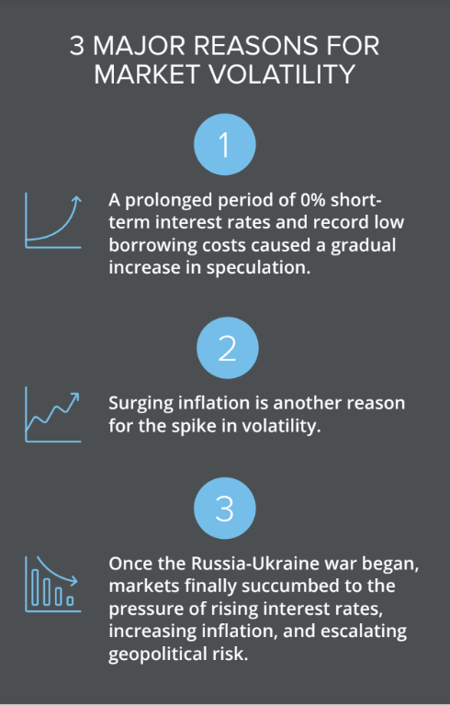Interest rates are a primary factor influencing the majority of financial assets. According to a recent survey by Bankrate, 60% of Americans aged 55 and older are worried that rising interest rates will negatively impact their retirement savings. This concern is valid, as higher interest rates can reduce the value of fixed-income investments, such as bonds, and increase the cost of borrowing money for retirees who rely on income generated by their savings.
While rates are most commonly associated with the bond market, they are also a key input in traditional equity valuation models, which use market interest rates to determine the appropriate discount rate for future cash flows. Bond valuation and the yield that investors require to own a particular fixed-income security are reliant on interest rates. Since reaching an all-time low in 2020, interest rates have increased in 2021 and have continued to rise in 2022. This has placed pressure on fixed incomes and certain areas of the equity market, causing stress in certain areas of the stock market, such as growth stocks, which are susceptible to interest rate shocks. In light of this, let's investigate why rates have been increasing and whether Fortune 500 employees should be concerned.
MORE AGGRESSIVE FEDERAL RESERVE
This year, the Federal Reserve (Fed) has increased interest rates by 75 basis points. A 25 basis point increase in March and a 50 basis point increase in May. The Federal Reserve is projected to raise interest rates by 50 basis points at its June and July meetings and will continue to do so through the majority of 2022. The fact that the Fed is eventually moving away from zero demonstrates confidence in the job market's health, given that inflation is soaring and the job market is thriving. However, the rate at which interest rates are anticipated to increase underscores its concern regarding the escalating cost of living. Residents of California and New York will experience higher financing costs as a result of this policy shift: No longer will mortgages and auto loans be absurdly inexpensive, and this, combined with higher inflation, may lead to less investment in the market and more spending on necessities. This is a major reason for market volatility, and it is essential for Fortune 500 employees and retirees to keep this in mind.
INFLATION CONCERNS
Additionally, inflation is a major factor in determining long-term interest rates. Rising inflation has the potential to erode fixed-income returns, so inflation expectations are a component of the required yield for investors to hold fixed-income securities. Simply put, inflation is the result of too much money chasing too few products, and it is feared that the increase in the amount of money in circulation may result in inflation. The extraordinary degree of fiscal and monetary stimulus implemented to combat the economic damage caused by Coronavirus resulted in a substantial expansion of the M2 money supply. As a result, this increase in the amount of money in circulation has led to a rise in consumer expenditure, but also elevated inflation.
RISKS OF A RECESSION
Now that the pandemic has begun to subside, the Fed has begun to raise short-term interest rates once more. This policy shift has increased market volatility for the three reasons listed to the right.
As the Fed begins to aggressively raise interest rates today, market participants are concerned that we may experience a period of high inflation and sluggish economic growth, also known as stagflation.
This environment is another reason why we believe and recommend to our Fortune 500 clients that diversification is the best method to protect portfolios from being overexposed to a single risk factor.

Economic Definitions
The M2 Money Supply, also known as "M2" or "Money Stock," measures the quantity of currency in circulation. M2 consists of M1 (physical currency and checkable deposits) in addition to less liquid money such as savings accounts.
Conclusion
Investing in the stock market is like sailing on the ocean, and interest rates are the wind that propels the boat. When interest rates are low, it's smooth sailing for growth stocks and other high-risk investments, but when interest rates rise, it's like a gust of wind that can toss the boat around and make it harder to navigate. Just as a sailor needs to adjust their sails to changing wind conditions, investors need to adjust their portfolios to changing interest rates. By diversifying their investments and paying attention to the winds of change, retirees can keep their financial ship on course even in stormy economic conditions.
Reference(s):
- Bankrate, "60% of Older Americans Worry Interest Rates Will Wreck Their Retirement Savings," published on August 26, 2021
